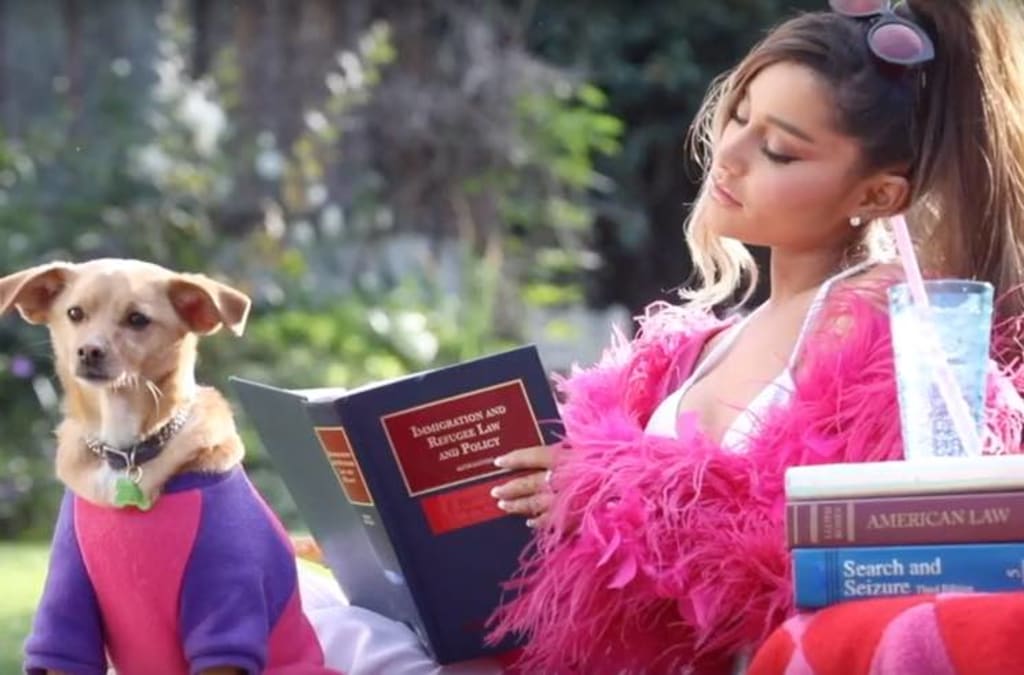
Queer digital magazine INTO recently published an article critiquing Ariana Grande's latest music video. With a title like "Ariana Grande's 'Thank U, Next' Music Video Is Surprisingly Anti-Queer" I expected an examination on what could go wrong when media that is 20 years old is shown in a modern context. I would have enjoyed that. That would have been fun.
That's not what this article was.
This article seemed to be an exercise in using the "right" words in the wrong way and ignoring or misunderstanding what the music video is, all under the guise of a critique. Starting off with saying that:
Laden with trans-misogyny, anti-queer jokes, and blackface, the video follows Ariana’s white feminist awakening through a celebrity-laden nod to several cult classics.
Here we start with using the "correct" terminology to draw the reader in. Calling this a white feminist awakening frames Grande a short sighted activist whose feminism doesn't extend beyond her white straight cis sisters. However, as we delve into the review we begin to see that this reviewer doesn't seem to understand what is being referenced in the video.
It begins with a confessional homage to Mean Girls detailing fictional Queen Bee Ariana’s influence over her peers’ lives and rumors they heard about her. It is unclear if Ariana is supposed to be the superficial antagonist of the video, like Regina George in Mean Girls or if she is attempting to portray underdog Cady Heron, who resists the Plastics normativity.
First of all...the Mean Girls confessionals are about a Regina Geroge-esque figure. Lines like "Ariana Grande told me I look sexy with my hair looked back." "...so I decided to punch myself in the face, it was awesome," refer to Regina George being talked about by her classmates...So I thought it was pretty clear that Grande was playing the Regina George role.
Moving forward...they accused Ariana Grande of blackface. Yeah. That happened.
Then you finally see it: the blackface. This may not be the type of blackface you see in old minstrel shows but a new form that we frequently view in pop culture. As New York University performance studies master’s student Ahn Vo writes, “Contemporary blackface no longer involves minstrelsy’s burnt cork or greasepaint to blacken the performers’ skin, but instead, make-up foundation, artificial tanning and digital coloring are employed to play with racial mythologies and to exploit what blackness signifies.”
Let's break this down. Note the need to re-examine blackface in the way it exists in the modern age, almost sounds like it's gonna be thought provoking. But in the words of Brandy Norwood, "almost doesn't count." Having read Vo's work I personally found many issues with that article. Mainly the lack of knowledge on the individual case studies, and the troubling things they associated with blackness. On Britney and Christina, Vo said that
exploding onto the mainstream music scene, both in 1999, with two massive breakout hits–“…Baby One More Time” and “Genie in the Bottle.” It is no coincidence that a few years after their debut, both of them felt the necessity to shake off their “girl next door” persona, stripping down to a much raunchier, darker, or shall I say blacker image of themselves to cater to the more mature market.
1. Genie in the Bottle was already sexual. She literally said her hormones are racing at the speed of light.
2. "Raunchier, darker, or shall I say blacker."
Or. Shall. I. Say. Blacker. B-L-A-C-K-E-R.
So you can see why I was hesitant to accept Vo's positioning on blackface after having read their article. Nothing like a definition from a ropey piece of writing to support an already ropey piece of work.
The more I delve into the article the more I see that the author seems to not understand the references in the video. Saying that "Queer people are apparently glad to be disrespected so long as it’s by someone as popular as Ariana" completely ignores that in playing a Regina George type, Grande was hardly going to be Ally of the Year to queer youth. Even the reading of Regina George as a closeted lesbian doesn't allow her to be nice to queer people. She's a mean girl. It's in the title. The take on the Bring It On section is... kinda un-needed (and it low-key contradicts their take on blackface because if Grande was playing with the mythologies of blackness then she wouldn't have such stark racial imagery as used in the film surely)
However, after a deep dig some sense is found in this. The framing of queerness in Legally Blonde isn't the best from an analytical perspective. The reliance on stereotypes of gay men for the characters is telling that this was a 2001 movie. It's of it's time. However, Grande recreating that within the video does highlight that problem in Legally Blonde. That could have been an interesting read. And herein lies the problem I'm finding with online criticism.
There seems to be a trend of online writers wanting to frame everything as the MOST problematic thing in the world, making it the absolute devil, instead of looking at how media reflects uncomfortable truths about our culture. The video does have some problematic elements. I'm not denying that, but I'm not happy about hyperbole being needlessly used to make work that is more sensationalist than productive.
Wanna look at the racial politics that come into play when a white girl makes R&B influenced music? Fine!
Wanna examine how non black people co-opting blackness in popular media effects actual black people? Go ahead!
Wanna look at the relationship between camp pieces of work, straight people, and queer communities? Live your dreams! That's a great group to look at!
But yelling, "Blackface!" "Racist!" "White feminist!" "White supremacy!" "Capitalism!" for the sake of clicks, is a disingenuous use of the work that it took to coin those terms and in all honesty? We could all do better.
About the Creator
Jo' Ash
A British Musical Theatre Person™ who loves and writes about identity, the arts, and popular culture sometimes all at once!
Follow me!
Twitter @Joashaha
Instagram @Joashhh






Comments
There are no comments for this story
Be the first to respond and start the conversation.